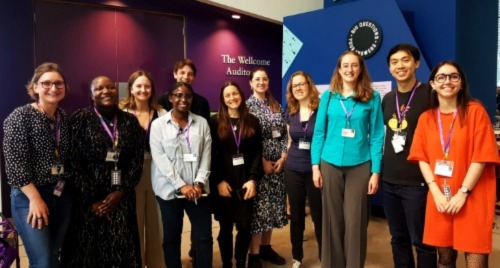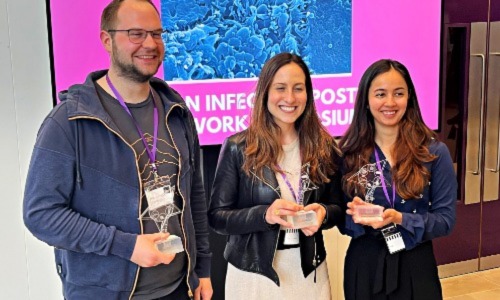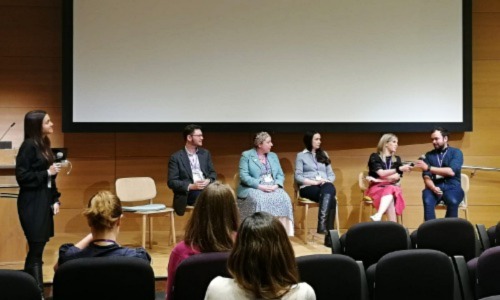The London Infection Postdoc Network Symposium: A Meeting Organised by ECRs for ECRs
The London Infection Postdoc Network (LIPN) is a multi-institutional platform founded in early 2022, with representatives from The Francis Crick Institute, Imperial College London (ICL), London School of Hygiene and Tropical Medicine (LSHTM), King’s College London, and University College London (UCL), with the aim of supporting scientific and social exchange between early career researchers (ECRs) working in the field of Infection Biology in London, UK. After spreading the word, the LIPN started organising hybrid bi-monthly meetings with short talks by members and invited speakers, thus promoting knowledge exchange, scientific discussion, and collaboration between London-based early career researchers..
With the promising feedback from these meetings in mind, the LIPN Committee applied for and was awarded the Crick Partnership Networking Fund in May 2022, a scheme aiming to support collaboration between institutions. This fund gave LIPN the opportunity to organise its first symposium, envisioned as an event organised by ECRs to support ECRs.
After months of organising, sending a lot of emails, promoting the event and multiple meetings to discuss our advances (from catering menus to talk selections and contacting sponsors), our very first LIPN Symposium took place on 6 June 2023 at The Francis Crick Institute (London, UK)

The event was free to make it accessible to anyone interested in or working on infection biology, from university students to group leaders. The programme included two keynote speakers, thanks to the support of a Microbiology Society conference grant, a round table discussion on careers beyond and in academia, as well as selected talks and posters from ECRs.
Our symposium attracted around 100 ECRs from across London and other cities such as Cambridge, and we were very impressed by the interest shown by representatives from a wide range of industry sponsors: 2B scientific, Avantor, Integra, New England Biolab, PCR Biosystems, Proteintech, Stemcell Technologies, Stratech, Biolegend and Thistle Scientific.
The symposium featured three main scientific sessions to integrate broad research approaches: bacterial, viral and eukaryote (parasites and fungi) infection biology. The day was packed with outstanding talks and poster presentations by ECRs. However, we want to highlight our two prize winners for best talks of the day: Laura Martin-Sancho (ICL) and Felix Scharte (MRC-LMB). Laura Martin-Sancho presented her novel systematic approach using multiOMICs (transcriptomics and proteomics) to identify host defence mechanisms against RNA viruses, focussing on dengue virus, in relevant cell models. Felix Scharte’s work focussed on how typhoidal Salmonella invades and survives in epithelial cells using exciting single-cell microscopic analyses, showing how the pathogen can employ flagellum-mediated cytosolic motility as a potential mechanism for bypassing cellular immunity. Thanks to our amazing sponsors, we were also able to award a best poster prize to Ashima Wadhawan (ICL). Her work focussed on the opportunistic pathogen Enterococcus faecalis and showed that Drosophila-adapted E. faecalis strains exhibited immune resistance and enhanced virulence alongside mutations associated with antibiotic resistance, which arose in the absence of antibiotic exposure.

As previously mentioned, we invited two outstanding speakers, Dr. Karrera Djoko and Professor Dirk Bumann. Dr. Karrera Djoko’s plenary talk rounded off the morning session with her latest research on the importance of metals as micronutrients, not only for pathogens during infection, but also for the regulation of the commensal microbiota, thus challenging the notion of nutritional immunity. Professor Dirk Bumann closed the symposium with his keynote talk. His work stunned the audience with impressive fluorescence imaging, from single cells to whole tissue samples, giving a deeper understanding of the heterogeneity of Salmonella infection in mouse spleens and the pathogenicity of Staphylococcus aureus in humans.
In addition to the research-focussed talks we invited a careers panel. We aimed to host a panel with diverse career paths to give our ECR audience the opportunity to ask questions and to facilitate an open discussion on careers within and beyond academia. Nico Fanget (Nature Editor), Nicola Evans (Senior Scientist at Isogenica), Claire de May (Virology programme manager at the MRC), Laura Pallett (Group Leader at UCL) and Ben Swift (co-founder of PBD Biotech and group leader at RVC), gave us insights and advice about different paths in their careers.

This session proved to be very popular and was heavily mentioned in the positive feedback. We had such amazing audience participation that the session could have easily been extended; a lesson learned for next year.
So what are our conclusions? The feedback has been overwhelmingly positive, with participants praising the organisation of the event, the schedule, the quality of the talks and the round table discussions. This is not only reflected in the proactive participation in discussions during the sessions, but also in our feedback form. The event was inspiring for all, not only on the research side, but also gave us the opportunity to discuss, connect and get advice. We, the LIPN Committee, could not be more flattered by the result of the effort we put into the organisation. This event, organised by ECRs for ECRs, would not have happened if we had not been a good team. From the initial application to the Crick Fund, Microbiology Society grant, and sponsor race, to the last minute schedule changes and powerpoint-slide design, this was a team effort! The experience we got during this organisation process helped (perhaps even forced) us to get closer together and support each other. We look forward to expanding our network, incorporating representatives from other centres and institutions in London, and continuing the ECR seminars that allow us to discuss science and other work-related topics with our peers in a comfortable, relaxed environment. Hopefully, in a year’s time, we will be writing a second blog post about the success of our second LIPN symposium, this time with even more participants and tackling more topics inside and outside academia! Until then, please visit our website, join our mailing list or follow us on twitter @LondonPostdoc.
